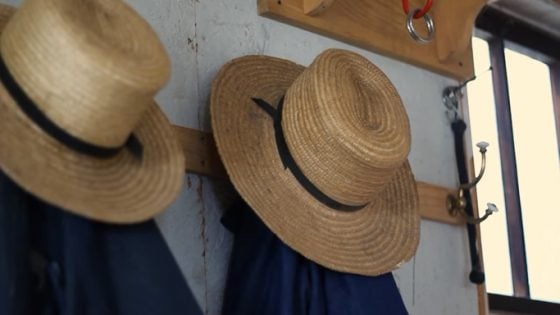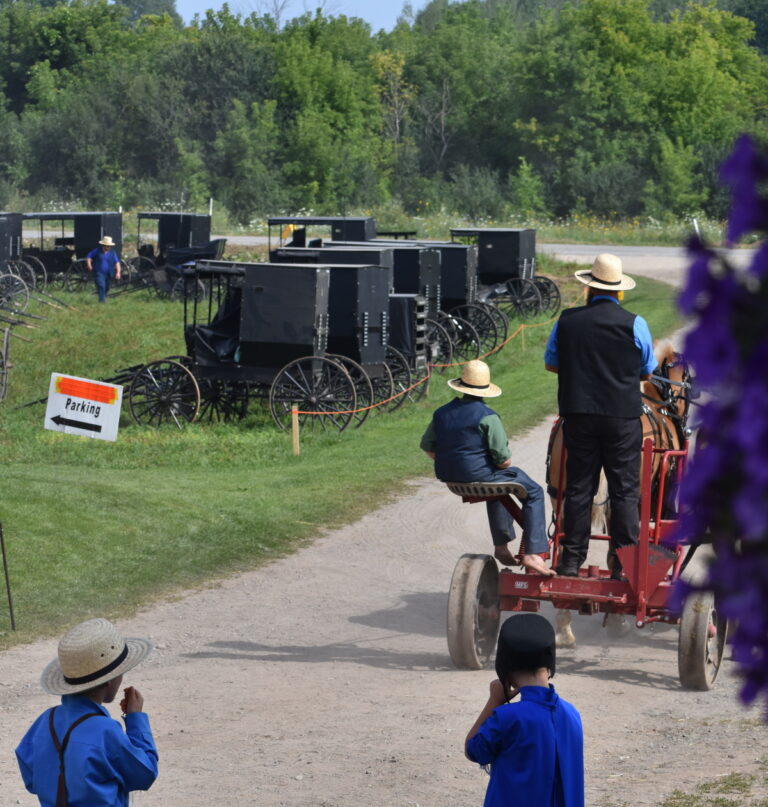The northern Indiana Amish RV industry
A Goshen News article just out on layoffs among nothern Indiana Amish factory workers brings to light the challenge that local Amish, many of whom are dependent on factory income, are facing as hours and jobs are cut in a limping economy.
Most Amish heads of household work in the local RV industry, and most people would consider RVs a non-essential item.
Skyrocketing oil prices in the first half of the year certainly did not help RV sales, though one would think that to be less of a factor now that they’ve subsided to sub-$2 levels. Of course, what happens once, can happen again…
The Amish in northern Indiana are in a bit different situation occupationally (more on Indiana Amish occupations) than those in the other two large settlements, Holmes County, OH and Lancaster, PA. While those two communities are highly entrepreneurial, northern Indiana is less so.
Entrepreneurial pursuits here are less developed, often comprising ‘sideline’ work rather than a full-time occupation. This is easy to see when traveling through the settlement. You don’t find nearly as many shops here as you do in the community’s Ohio and PA counterparts.
Statistically, the local Amish are much more heavily dependent on factory work. ‘Farmettes’, plots of just a few acres with a small horse barn and not much else, are popular, yet farming itself has dwindled to low levels.
Selling books in the Elkhart/Lagrange community in the summer of 2006, I had a firsthand look at this community as I visited each of the 120+ church districts.
Even in that period, temporary layoffs were occurring among the Amish. Some factory hands were on a four-day a week schedule. Speaking with Amish breadwinners at the time, it was definitely a concern, but not nearly as serious as it seems to be today.
Thanks to high wages, there is, or at least there has been up til now, a lot of disposable cash in this community. At this point some, if not many, must be rethinking not only purchasing decisions but also their occupational choices.
A shift to small business?
The article cites estimates that 50 to 75 percent of Amish factory workers have filed for unemployment. To be honest, this seems awfully high, but apparently reflects a change in this community on the acceptability of receiving government financial help. Government assistance is typically avoided by the Amish, who were first granted federally-sanctioned exemption from the Social Security program in the 1960s.
Small businesses are also affected when the economy tightens, but their owners have the advantage of a degree of flexibility that a factory worker dependent upon a single industry simply does not have.
For example, some Amish home builders have shifted to remodeling work, a sector that tends to prove more resilient when new home building declines. Other entrepreneurs are able to specialize or to focus on goods and services whose demand is less affected by economic downturns.
In my opinion, the two most interesting issues here are the unemployment benefits situation and the implications it will have for Amish in this and other communities, and also the question of whether small business among the Amish in northern Indiana will be boosted in the long-term as a result of this recession.
According to the article, it seems that there has been some new interest among local Amish for small business, but whether it indicates a significant, long-lasting shift remains to be seen.
My gut says that if that many Amish have shown interest in unemployment benefits, there will be a marked change in the perception of factory work vis-a-vis the sustainability of the Amish way of living in this community.
For a long time, the factory has been seen as a simple way to support a family on a very comfortable income. But it seems that local Amish are really getting bitten this time due to over-dependence on a single industry. Economic hard times will pass and RVs will likely return, but not without the community having drawn a lesson from the experience.
So if I were a betting man, I’d bet there will be a significant, long-lasting upward change in the percentage of northern Indiana Amish operating their own (full-time) firms.
Read more on this and other Indiana Amish communities, or visit the Indiana Amish furniture directory for more on Hoosier Amish woodworking.







Without reading deeper… this also have an impact. Tornado destroying RV factory just outside of Nappanee last spring. Two of my siblings lives in that area and brother spoke of being happy to have a job even if it got reduced to part-time due to lack of demand!
It seems to me the Amish of the Indiana community lacked wisdom, here. But maybe it will be a test of their faith in the Amish ways…
There’s already evidence of a switch among the Amish in that area to the woodworking industry, it seems:
“But many Amish workers are switching over to the woodworking industry, Zehr said. Also, he said, Amish families are less likely to leave the county because of job losses.”
http://www.journalgazette.net/apps/pbcs.dll/article?AID=/20081211/BIZ/812110304
I’m kind of disappointed to see the Amish taking government assistance. Not that they have to put living up to my standards for them ahead of feeding their families. 🙂
That was an interesting article Mark. This too shall pass, but looks like it will be painful for some folks. Of course ‘hard times’ are relative, and pain is not necessarily a bad thing, if you come out stronger on the other end…that’s my two cents of philosophy for the day I suppose.
Happy New Year to everyone and a big thanks for reading the blog!!
I’m surprised to see them taking government assistance. I hate to be so krass here – but if they are going to take government assistance than they need to be filling out their draft slips at the post office.
I’m sorry – but I see a trend of hypocracy in this community by accepting government assistance. One great thing about the Amish is that they are totally self-reliant and are able to flourish autonomously which is one reason they can successfully avoid paying some taxes and signing up for the draft. The minute they have to rely on the government is the minute they loose some of those rights as far as I’m concerned.
I think this econonic repression all are going through might make certain Amish orders rethink their connections to the outside world and us ‘Englishers’. I know if I were a Bishop, I would gather the elders and have a pow-wow or several pow-wows about the future of all Amish and Mennonite groups/orders…